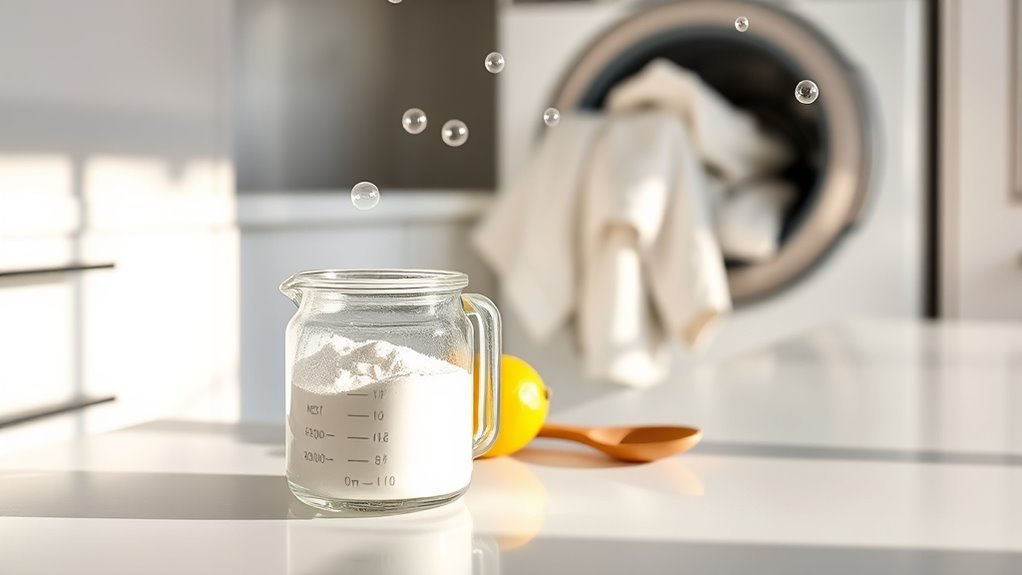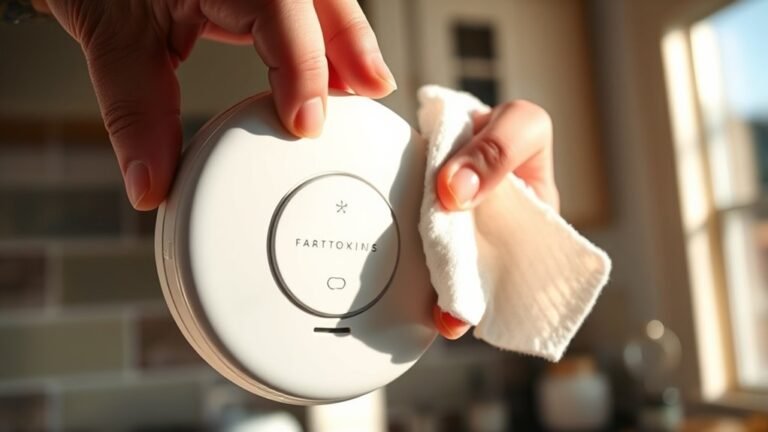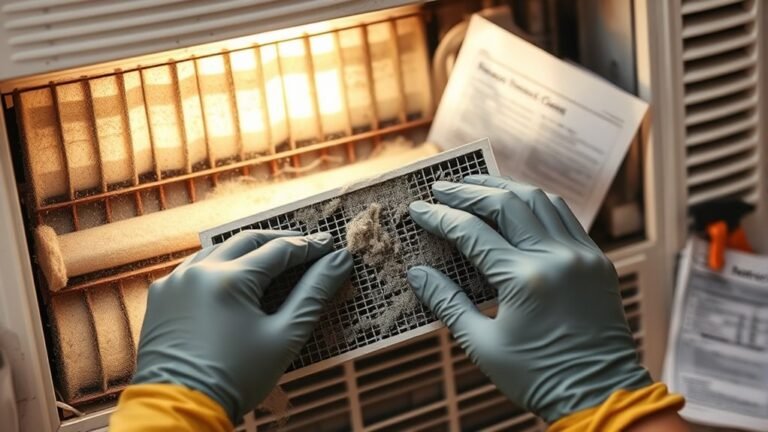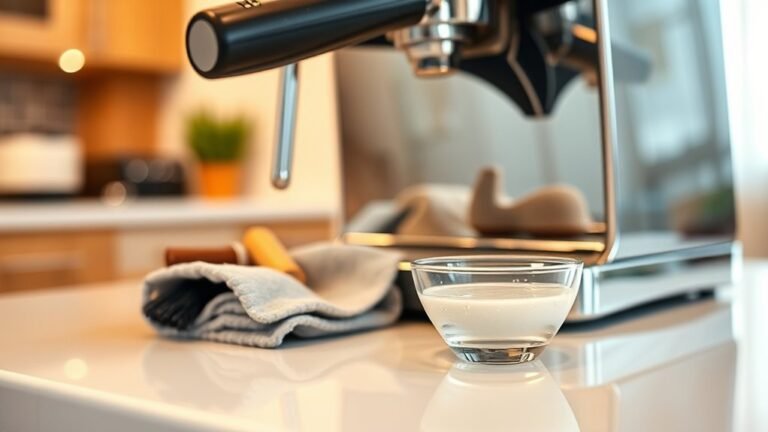How to Make Homemade Washer Cleaner
To make homemade washer cleaner, combine one cup of white vinegar with half a cup of baking soda. Pour the vinegar into the detergent dispenser or drum, then add the baking soda. Run the washing machine on the hottest, longest cycle without clothes to break down residue and eliminate odors. For front-load washers, use the detergent dispenser; for top-load, you can add directly to the drum. Monthly use maintains efficiency and prevents buildup. You can explore detailed usage tips and maintenance advice next.
Why Regular Washing Machine Cleaning Is Important
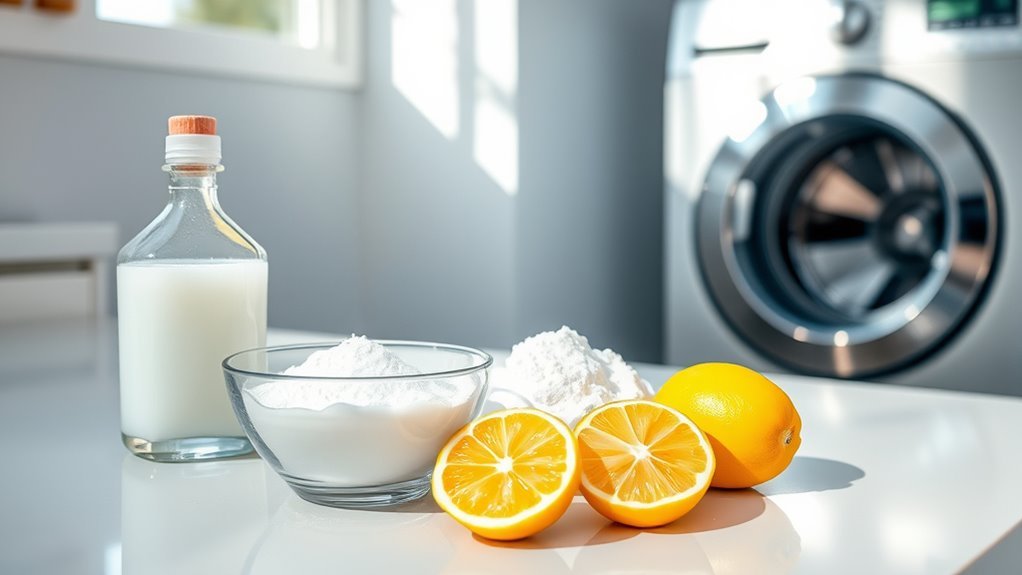
Although you might not see it, residue from detergent, fabric softener, and dirt builds up inside your washing machine over time, which can impair its performance and lead to unpleasant odors. Performing routine maintenance by regularly cleaning your washer prevents this buildup, ensuring efficient operation and ideal water drainage. Neglecting these tasks can reduce your washer lifespan by causing mechanical wear and promoting mold growth. To maintain freedom from costly repairs and premature replacement, establish a cleaning schedule that includes wiping seals, running cleaning cycles with appropriate solutions, and inspecting detergent dispensers. This disciplined approach not only preserves machine integrity but also guarantees hygienic washing conditions, ultimately extending your washer’s functional life and maintaining its effectiveness without relying on commercial cleaners. Additionally, using natural detergents in your laundry routine can minimize residue buildup and protect both your washing machine and bedding fabric.
Common Causes of Washer Odors and Residue
You’ll often find washer odors and residue caused by mold and mildew growth in damp, poorly ventilated areas of the machine. Additionally, soap scum buildup from detergent and fabric softener can accumulate on internal surfaces, contributing to unpleasant smells. Identifying these factors helps you target your cleaning efforts effectively. Regular maintenance using vinegar and baking soda can prevent these issues and keep your washer fresh.
Mold and Mildew Growth
A primary cause of washer odors and residue is the growth of mold and mildew within the machine’s interior. You’ll want to focus on mold prevention by ensuring the washer is dry and well-ventilated after use. Mildew removal requires systematic cleaning to stop spores from thriving in damp areas like door seals and detergent dispensers.
| Step | Action | Result |
|---|---|---|
| Inspect | Check seals and drum for mold | Identify problem areas |
| Clean | Use vinegar or baking soda | Kill mold and mildew |
| Dry & Vent | Leave door open after cycles | Prevent future growth |
Following these steps gives you control over mold prevention and mildew removal, keeping your washer fresh and free from odors.
Soap Scum Buildup
Several factors contribute to soap scum buildup inside your washer, including the type of detergent used, water hardness, and washing frequency. Detergents with low solubility or excessive use combine with minerals in hard water, forming insoluble residues on the drum and seals. This accumulation restricts water flow and traps odors, reducing effectiveness. To prevent and address soap scum buildup, perform regular soap scum removal by running a cleaning cycle with a homemade solution designed to break down residues. Incorporate vinegar or baking soda in your cleaning routine for effective cleaning without harsh chemicals. Maintaining ideal detergent levels and selecting formulations suited for your water type further minimizes buildup. Adopting these procedural steps guarantees your washer operates efficiently, preserving both cleanliness and your freedom from frequent maintenance.
Ingredients Needed for Homemade Washer Cleaner
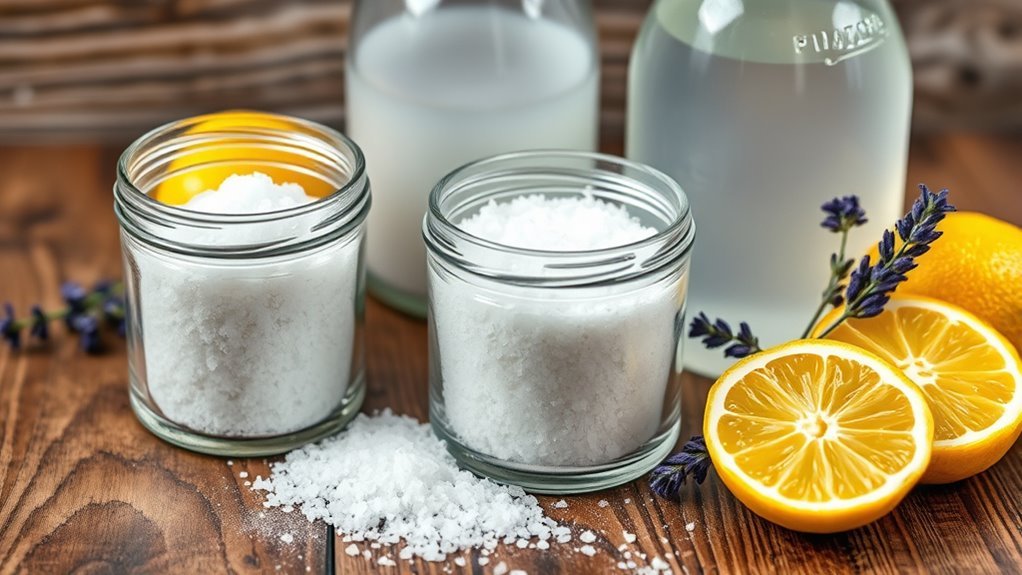
Three common ingredients form the foundation of an effective homemade washer cleaner: white vinegar, baking soda, and essential oils. White vinegar acts as a powerful cleaning agent, breaking down mineral deposits and soap scum without harsh chemicals. Baking soda serves as a mild abrasive and deodorizer, enhancing the cleaning process by neutralizing odors and loosening grime. Essential oils, such as tea tree or lavender, provide antimicrobial properties and a fresh scent, making your solution both effective and pleasant. These ingredients combine into an eco friendly solution that avoids toxic residues, giving you control over what touches your washer. By selecting these precise components, you guarantee your homemade cleaner is safe, efficient, and aligned with sustainable cleaning practices, granting you freedom from commercial product limitations.
Step-by-Step Guide to Making Your Own Washer Cleaner
To make your own washer cleaner, start by measuring one cup of white vinegar and pouring it directly into the detergent dispenser or drum of your empty washing machine. Next, add half a cup of baking soda to enhance cleaning power and deodorize. Close the machine and set it to run on the hottest and longest cycle available. This process activates the homemade cleaner, effectively breaking down residue and buildup. Once the cycle completes, leave the washer door open for an hour to allow moisture to evaporate, preventing mold growth. For ideal washer maintenance, repeat this procedure monthly. This method guarantees your machine stays fresh, efficient, and free from lingering odors without relying on commercial products. You’re taking control of your washer’s longevity with this simple, effective homemade cleaner.
How to Use Homemade Cleaner for Front-Load Washers
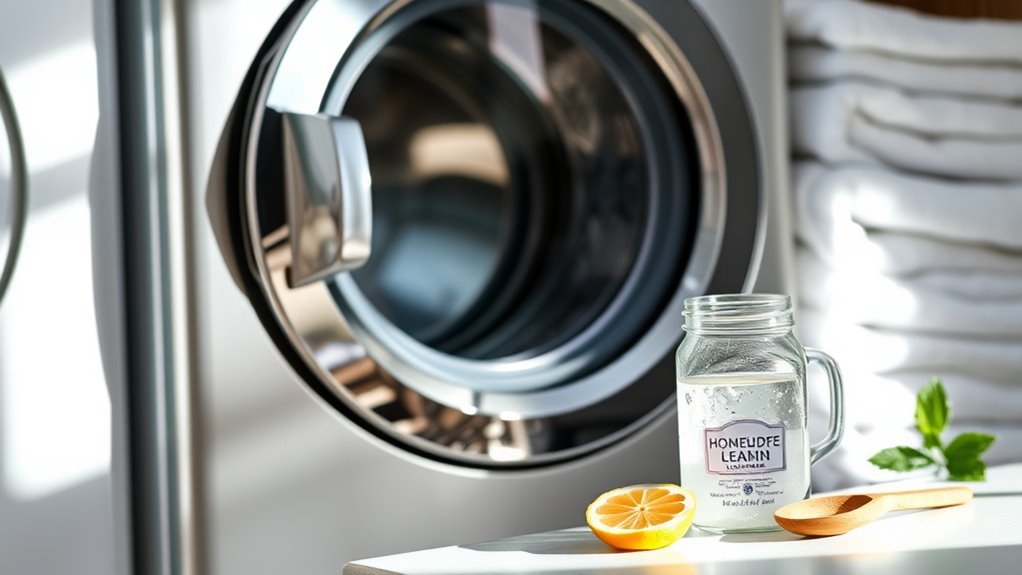
After preparing your homemade cleaner, applying it correctly in a front-load washer requires specific steps to guarantee ideal cleaning and maintenance. Start by ensuring the drum is empty. Pour the recommended amount of homemade cleaner directly into the detergent dispenser, not inside the drum, to enhance cleaner application. Select the hottest water setting and run a complete front load washing cycle without any laundry. This high temperature activates the cleaner’s properties, effectively breaking down residue and mold buildup typical in front-load washers. Once the cycle ends, leave the door open to allow full drying, preventing moisture accumulation. Perform this process monthly to maintain excellent washer performance, ensuring your machine remains free of odors and deposits, granting you the freedom of efficient, fresh laundry every time. Using natural ingredients like baking soda and vinegar is safe and helps prevent damage to the washer’s seals and components, preserving its integrity and lifespan.
How to Use Homemade Cleaner for Top-Load Washers
Using homemade cleaner in a top-load washer involves a straightforward process to guarantee effective removal of residue and buildup. First, select a homemade cleaner recipe suitable for your washer. Add the cleaner directly to the drum or detergent dispenser. Run a complete wash cycle on the hottest water setting without clothes. Repeat this process according to your washer cleaning frequency—ideally once a month.
| Step | Action | Notes |
|---|---|---|
| 1 | Choose homemade cleaner recipe | Vinegar and baking soda preferred |
| 2 | Add cleaner to drum or dispenser | Avoid liquid fabric softener use |
| 3 | Run hot water cycle | Guarantees thorough cleaning |
| 4 | Repeat monthly | Maintains ideal washer hygiene |
This method preserves your washer’s efficiency while granting you cleaning freedom.
Additional Tips for Maintaining a Clean Washing Machine
Although regular cleaning cycles are essential, maintaining your washing machine also requires attention to specific components like seals, dispensers, and filters. To optimize washer maintenance, inspect rubber door seals monthly for mold and debris; clean them with a damp cloth to prevent buildup. Remove and rinse detergent dispensers every two weeks to avoid residue accumulation. Check and clean the lint filter according to your machine’s manual, typically every month. Adjust your machine cleaning frequency based on usage—once a month suits frequent users, while quarterly may suffice for occasional use. Additionally, leave the door open after cycles to air dry and inhibit mildew. Following these washer maintenance tips guarantees efficient performance, extends machine lifespan, and maintains your freedom from costly repairs and unpleasant odors. Regularly checking and replacing hoses every 5 years can prevent leaks and water damage to your washing machine.
Natural Alternatives to Vinegar and Baking Soda
You can enhance your washer cleaner by incorporating essential oils for their antimicrobial properties and fresh scent. Lemon juice acts as a natural acid to break down mineral deposits and soap scum effectively. Additionally, borax boosts cleaning power by softening water and removing residues during the wash cycle. For best results, make sure to use non-abrasive cleaners to protect your washing machine’s surfaces and maintain its efficiency.
Essential Oils Benefits
While vinegar and baking soda are common choices for homemade washer cleaners, essential oils offer a natural alternative that can enhance cleaning effectiveness and provide antimicrobial properties. When you use essential oil blends, you not only improve odor control but also benefit from aromatherapy benefits, promoting a clean, revitalizing environment. To maximize effectiveness, carefully select oils based on their antimicrobial strength and scent profile.
| Essential Oil | Antimicrobial Strength | Aromatherapy Benefits |
|---|---|---|
| Tea Tree | High | Purifying, invigorating |
| Eucalyptus | Moderate | Rejuvenating, clarifying |
| Lavender | Moderate | Calming, soothing |
Incorporate 10-20 drops of your chosen blend into your cleaning solution for ideal performance and freedom from harsh chemicals.
Lemon Juice Uses
In addition to essential oils, lemon juice serves as a powerful natural cleaner with acidic properties that effectively break down mineral deposits, soap scum, and residue inside your washer. Its cleaning benefits stem from citric acid, which dissolves buildup without harsh chemicals, making it an excellent alternative to vinegar and baking soda. To harness lemon juice for washer cleaning:
- Pour 1 cup of lemon juice into the detergent dispenser before running a hot wash cycle to remove odors and limescale.
- Use lemon juice mixed with water to wipe down rubber seals and detergent trays, preventing mold and mildew.
- Combine lemon juice with baking soda for a paste to scrub stubborn stains inside the drum safely.
Borax Cleaning Power
A mineral salt, borax offers strong cleaning and deodorizing properties that make it an effective natural alternative to vinegar and baking soda for maintaining your washer. To harness borax effectiveness, dissolve 1/2 cup of borax in hot water and add it to the drum. Run a hot wash cycle without clothes to eliminate residue and odors. Borax’s alkaline nature breaks down grime, mold, and detergent buildup efficiently. Regarding borax safety, always handle it with gloves, avoid inhalation, and store it out of reach of children and pets. Its low toxicity makes it safer than many commercial cleaners, but proper ventilation during use is essential. By following these precise steps, you maintain your washer’s performance and extend its lifespan while using a natural, effective cleaner.
When to Consider Professional Washer Maintenance
How do you know when your washer needs professional maintenance instead of just a homemade cleaning? If you want to maintain peak performance and extend your washer’s lifespan, scheduling a professional inspection is vital. Professionals follow a maintenance schedule designed to catch issues early and guarantee all mechanical and electrical components function properly.
Schedule professional washer maintenance to ensure peak performance and catch issues early before they become costly problems
Consider professional maintenance if you notice:
- Unusual noises or vibrations during cycles
- Persistent odors or residue despite regular cleaning
- Error codes or malfunctioning controls
Following these guidelines helps you maintain freedom from unexpected breakdowns and costly repairs. While homemade cleaners tackle surface grime, a professional inspection addresses internal wear and tear, making sure your washer operates efficiently and safely. Don’t wait for failure—incorporate professional maintenance into your routine. Regularly inspecting and cleaning key components can prevent many common washer issues.
Frequently Asked Questions
Can Homemade Washer Cleaner Damage Rubber Seals or Hoses?
You shouldn’t worry too much about homemade washer cleaner damaging rubber seal maintenance or hose durability if you use mild, non-abrasive ingredients. Harsh chemicals can degrade seals and hoses over time, so avoid bleach or strong acids. Instead, opt for gentle solutions like vinegar and baking soda, which clean effectively without compromising rubber integrity. Regularly inspect seals and hoses to guarantee they remain flexible and undamaged, preserving your washer’s longevity and performance.
How Often Should I Clean My Washing Machine With Homemade Cleaner?
You should perform monthly maintenance on your washing machine to keep it running effectively and odor-free. Establish a cleaning schedule where you use your homemade cleaner once every 30 days. This routine helps prevent buildup in the drum, seals, and hoses without risking damage. Consistency in your cleaning schedule guarantees peak performance and extends your machine’s lifespan, giving you the freedom to focus on laundry without worrying about hidden grime or malfunctions.
Is It Safe to Use Homemade Cleaner With All Detergent Types?
Imagine mixing oil and water—some things just don’t blend well. When using homemade cleaner, you need to take into account detergent compatibility carefully. Not all detergents react safely with natural acids or baking soda in homemade solutions. To guarantee safety precautions, always check your detergent’s ingredients and avoid combining harsh chemicals. Test a small wash cycle first to prevent damage. This way, you maintain your machine’s freedom without risking its integrity.
Can Homemade Cleaner Be Used in High-Efficiency Washers?
You can use homemade cleaners in your high-efficiency washer, but ensuring high efficiency compatibility is essential. Homemade solutions should be low-sudsing to maintain washer cleaning effectiveness and prevent residue buildup. Always follow your washer’s guidelines and use measured amounts to avoid interfering with the machine’s sensors. By doing so, you’ll maintain your washer’s performance while enjoying the freedom of using natural, homemade cleaning agents safely and effectively.
How Should I Store Leftover Homemade Washer Cleaner?
Like keeping a secret safe, you should store leftover homemade washer cleaner in an airtight glass container to preserve its effectiveness. Follow labeling guidelines by clearly marking the container with the cleaner’s contents and date made. Store it in a cool, dark place, away from children and pets. This guarantees safety, maintains potency, and gives you the freedom to use it whenever you need without confusion or risk.
